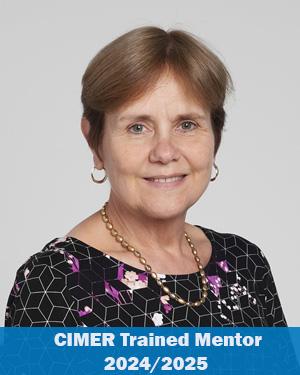Christine Moravec Laboratory
-
Christine Moravec Laboratory
- Principal Investigator
- Research
- Our Team
- Publications
- Careers
- Research News

Christine Moravec, PhD
Staff
Director, Research Education & Training Center, Lerner Research Institute
Email: [email protected]
Location: Cleveland Clinic Main Campus
Research
Research in my laboratory focuses on human heart failure (HF), using 2 different approaches. First, we investigate the physiological and biochemical changes during HF, and ask if these changes can be reversed by current therapies. We collaborate with clinical colleagues to obtain patient information and perform laboratory studies on tissue samples from patients. Ongoing work focuses on the Sympathetic and Parasympathetic Nervous Systems and their roles in human HF, as well as differences between males and females in HF. Secondly, we investigate the role of psychophysiologic remodeling in HF, utilizing biofeedback-assisted stress management (BFSM) and testing the hypothesis that this type of intervention can also impact the cellular and molecular phenotype in HF patients. Our goal is to demonstrate biologic remodeling of the failing heart following BFSM. The newest project in our lab tests the effects of several different stress management techniques in patients with coronary artery disease, again using biologic and clinical endpoints. Collaborative research also tests the hypothesis that BFSM will improve clinical status and quality of life in patients with diabetes and multiple sclerosis. Funding from the CCF Product Development Fund is helping us to create a handheld biofeedback device for patient use at home.
Biography
Education & Professional Highlights
Appointed
1993
Education & Fellowships
Medical Education - Cleveland State University
Cleveland, OH USA
1988
Graduate School - John Carroll University
University Heights, OH USA
1984
Undergraduate - John Carroll University
University Heights, OH USA
1978
Additional Training
- Postdoctoral Fellowship, Cell Physiology, Cleveland Clinic
Professional Highlights
- Director of Basic Research, Kaufman Center for Heart Failure, Cleveland Clinic
- Director of Basic Science Education, Cleveland Clinic Lerner College of Medicine
- Outstanding Educator Award, Lerner Research Institute, Cleveland Clinic
- Kaiser Permanente Teaching Award, Cleveland Clinic Lerner College of Medicine
- Excellence in Research Education Award, Cleveland Clinic Lerner College of Medicine
Awards & Honors
- Established Investigator of the American Heart Association
- Outstanding Educator Award, Lerner Research Institute
- Kaiser Permanente Teaching Award, Cleveland Clinic Lerner College of Medicine
- Excellence in Research Education Award, Cleveland Clinic Lerner College of Medicine
Memberships
- American Heart Association
- Heart Failure Society of America
- American Psychosomatic Society
- American Physiological Society
- American Association for Applied Psychophysiology and Biofeedback
Research
Research in my laboratory focuses on human heart failure (HF), using 2 different approaches. First, we investigate the physiological and biochemical changes during HF, and ask if these changes can be reversed by current therapies. We collaborate with clinical colleagues to obtain patient information and perform laboratory studies on tissue samples from patients. Ongoing work focuses on the Sympathetic and Parasympathetic Nervous Systems and their roles in human HF, as well as differences between males and females in HF. Secondly, we investigate the role of psychophysiologic remodeling in HF, utilizing biofeedback-assisted stress management (BFSM) and testing the hypothesis that this type of intervention can also impact the cellular and molecular phenotype in HF patients. Our goal is to demonstrate biologic remodeling of the failing heart following BFSM. The newest project in our lab tests the effects of several different stress management techniques in patients with coronary artery disease, again using biologic and clinical endpoints. Collaborative research also tests the hypothesis that BFSM will improve clinical status and quality of life in patients with diabetes and multiple sclerosis. Funding from the CCF Product Development Fund is helping us to create a handheld biofeedback device for patient use at home.
Our Team
Selected Publications
View publications for Christine Moravec, PhD
(Disclaimer: This search is powered by PubMed, a service of the U.S. National Library of Medicine. PubMed is a third-party website with no affiliation with Cleveland Clinic.)
- Barrows ... Moravec, et al. Robust gene expression with amplified RNA from biopsy-sized human heart tissue. J Mol Cell Cardiol 42:260-264, 2007.
- Huang ... Moravec, et al. Co-expression of skeletal and cardiac troponin T decreases mouse cardiac function. Am J Physiol 294:C213-222, 2008.
- Moravec. Biofeedback therapy in cardiovascular disease: rationale and research overview. Cleve Clin J Med 75:S35-S38, 2008.
- Pilbrow ... Moravec, et al. Genomic selection of reference genes for real-time PCR in human myocardium. BMC Medical Genomics 2008: 1:64: doi:10.1186/1755-8794-1-64.
Careers
Training at Lerner Research Institute
Our education and training programs offer hands-on experience at one of the nationʼs top hospitals. Travel, publish in high impact journals and collaborate with investigators to solve real-world biomedical research questions.
Learn MoreResearch News

Cleveland Clinic offers opportunities for clinicians and researchers to gain much-needed high-performance computing skills to approach their jobs in new ways.

With new federal support for this longstanding cross-city collaboration in education and training, research teams at Lerner Research Institute and CSU seek to increase the number of minority scientists in the Cleveland area.